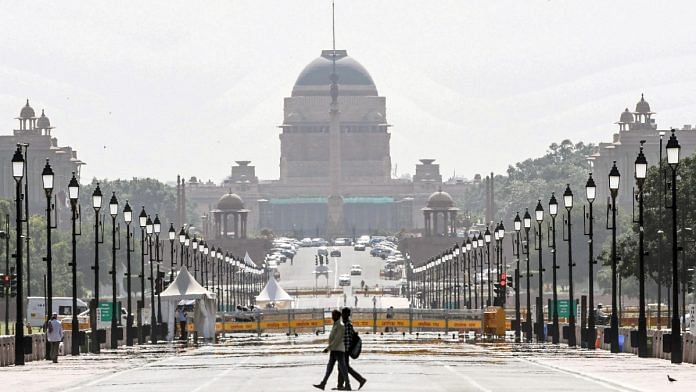New Delhi: The government’s proposed new procedural criminal law seeks to make final the President’s decision on a mercy petition, taking away long-standing powers of the courts to review such decisions. The Bharatiya Nagarik Suraksha Sanhita, 2023, seeks to introduce a new provision, Section 473, which bars any appeal against an order by the President to either grant or deny a pardon or commute a death sentence.
It may be recalled that the Centre in the Monsoon session of Parliament in August introduced three bills — Bharatiya Nyaya Sanhita, 2023, Bharatiya Nagarik Suraksha Sanhita, 2023, and the Bharatiya Sakshya Bill, 2023 — to replace the Indian Penal Code (IPC), the Code of Criminal Procedure (CrPC), and the Indian Evidence Act, respectively.
Over the decades, courts have overturned the decisions of the President via judicial review citing inordinate delay by the office of the President to decide on such pleas. If the new law comes into force, courts will lose their power of judicial review and the word of the President will be considered final.
It is critical to note that while the bill takes away the remedy of approaching courts and gives the government 60 days to make recommendations, it does not prescribe any time limit for the President to decide on mercy petition. This essentially means the issue that judicial review attempted to solve will continue to persist.
However, an advocate told ThePrint that despite the new proposed bill, the remedy of a writ will always be open to an affected victim.
“Even if there is no statutory appeal provided by the law against the President’s decision, a person can still file for judicial review by filing a writ petition before constitutional courts. That option will always be available to an affected individual, like as it exists today,” said advocate Pranav Sachdeva.
ThePrint explains key changes that The Bharatiya Nagarik Suraksha Sanhita seeks to bring to the mercy petition law as it has existed in India for decades.
Also Read: ‘Blatantly erroneous’ — how 56 death sentences in 14 months defied latest Supreme Court guidelines
Mercy petitions in India
Under Article 72 of the Constitution, the President wields five types of pardoning powers which differ in their extent and application.
The Constitution allows the President to grant pardons, where both the sentence and conviction are absolved; reprieves, where the death sentence is stayed for a temporary period; respites, where a sentence lesser than original sentence is awarded; or remission, where the sentence is reduced but the character of the punishment remains the same.
It also allows the President to suspend, remit, or commute a death sentence.
The governor, too, has pardoning powers under Article 161, but it does not extend to capital punishment.
Under the existing law, even after a mercy petition is rejected by the President, not everything is over for the convict. The President’s decision on the pardon is subject to a judicial review and a review by the courts.
In a 2006 landmark decision, the Supreme Court had held that the President’s decision could be challenged where it was passed without application of mind, was mala-fide, passed on extraneous or irrelevant considerations, relevant materials were kept out of consideration, or it suffered from arbitrariness.
Section 473: The new proposed law
With the proposed legislation, the government has now attempted to reverse this precedent — barring the convict from availing any such remedy of a judicial review.
Through Clause 7 of the new provision, the government seeks to give finality to the order of the President under Article 72. It makes the President’s word the final word on a mercy petition and bars any court from looking into the process of arriving at the decision to accept or reject it.
“No appeal shall lie in any Court against the order of the President made under article 72 of the Constitution and it shall be final, and any question as to the arriving of the decision by the President shall not be enquired into in any Court,” reads the new provision.
The proposed section appears to be at odds with well-settled rules of division and balance of powers, where courts have found the decisions of the President to be ill-informed and riddled with procedural lapses.
Just last month, the Karnataka High Court commuted a death penalty of a 70-year-old man, more than three decades after he was imprisoned, and 10 years after his mercy petition was rejected by the President. In this case, the President had rejected the mercy petition in 2013, even though more than 14 former judges petitioned the Rashtrapati Bhavan saying that the execution might have been wrongly imposed.
There were also calls from Amnesty International to commute the sentence. Yet, the President had rejected the mercy petition. It was only the judiciary, in this case, the Karnataka High Court, that set aside the death penalty.
In the case of Shatrughan Chauhan (2014), the Supreme Court said that inordinate delay by the office of the President was tantamount to torture, while commuting the death penalty of more than 15 convicts. The top court had taken into account undue delay on the part of the office of the President in deciding mercy petition.
“It is the unpredictability of it all that really kills them (the convicts),” experts were quoted as saying at the time in a report by Mint, pointing to the long wait for a decision on their petitions which may lead to physical and mental agony.
If Section 473 becomes law, execution will be imminent once the mercy petition is rejected by the office of the President.
(Edited by Amrtansh Arora)
Also Read: Are courts awarding too many death sentences? 539 convicts on death row in 2022, highest in 17 yrs



